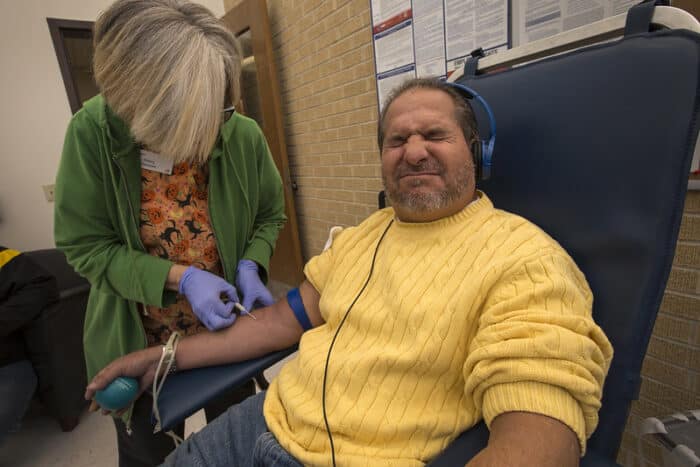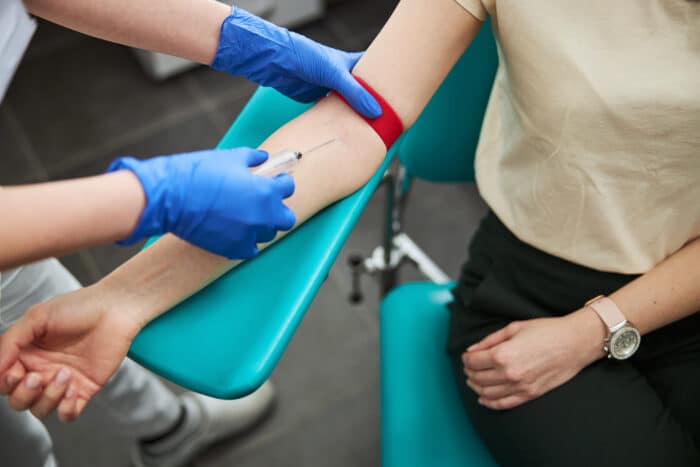If you’re an aspiring phlebotomist or are interested in entering the rewarding world of phlebotomy, you might have come across the terms ‘Phlebotomy Certification and ‘Phlebotomy License’.
Now, such terms thrown around freely can be pretty confusing, and you might be wondering if they are the same thing or if there are any differences between a certification and a license.
In this article, we aim to clear all such doubts and more.
So, let’s dive in!
Also see: What is a Phlebotomist
What is a Certified Phlebotomist?
A certified phlebotomist is a healthcare professional who has finished a training program for drawing blood and has met the requirements set by an accredited organization that gives out certifications.
These organizations can include the American Society of Clinical Pathology (ASCP), or the National Healthcareer Association (NHA). Getting certified as a phlebotomist means you go through thorough training on how to collect blood, keep things clean to avoid infections, talk to patients, and follow safety guidelines.
To become a certified phlebotomist, you usually need to meet some conditions, like finishing a training program and clearing the certification exam. This exam checks what you know about phlebotomy and how well you can do the job in real life.
Once you’re certified, you can put “Certified Phlebotomist” in your resume. This tells the employers that you know your stuff and are capable of handling all the duties of a phlebotomist.
Read: How to Become a Phlebotomist
What is a Licensed Phlebotomist?
A Licensed Phlebotomist, on the other hand, has special government-issued permission to do phlebotomy. Getting this license means following the rules set by the state or local government.
The rules can be very different depending on where you are. In some places, having a license is a must, while in others, you might not need one.
To get a phlebotomy license, you usually have to do a bunch of important things. This can include finishing a special phlebotomy training program, passing an exam that is approved by the state, and making sure you’re healthy and don’t have any problems in your background.

Do You Want To Become a Phlebotomist? Check Out Free Phlebotomist Masterclass!
In our masterclass you learn:
- How to be a Phlebotomist faster…in just 2 months!
- Avoid student debt & driving to classes
- #1 thing employers want from Phlebotomists
- How to stand-apart & get a university certificate for a strong resume
What are the Differences Between a Certification and a License?
Now that you know what a certified phlebotomist vs. a licensed phlebotomist is, you might be thinking:
But what are the key differences that set these two apart?
Let’s explore.
Regulation and Who’s in Charge:
Certification: When you’re certified, a separate group that’s not part of the government says you have a certain level of knowledge and skill.
Licensure: Getting a license means the government itself gives you permission to do something in a certain area.
What You’re Allowed to Do:
Certification: If you’re certified, you can do the things you learned in your training and what the certifying group says you can do.
Licensure: Being licensed means you can do what the law and rules in your area say you’re allowed to do when it comes to phlebotomy.
Moving Around:
Certification: Usually, if you’re certified, you might be able to use that in different places, but there could be extra things you need to do.
Licensure: Licenses are usually just for one place, and it might be hard to use them in another area.
Related FAQs
What is the difference between a phlebotomy certification and a phlebotomy certificate?
A phlebotomy certification and a phlebotomy certificate might sound similar, but they have different meanings.
A Phlebotomy Certification shows that you’ve met certain standards set by an independent organization. It’s like a badge that says you have the right skills and knowledge to do phlebotomy work. Getting certified involves passing an exam and meeting specific criteria. It’s a way to prove your expertise and dedication in the field.
On the other hand, a *Phlebotomy Certificate usually comes from completing a training program. It’s like a diploma that says you’ve finished a course in phlebotomy and learned the basics. This certificate doesn’t necessarily mean you’ve reached the same level of skill and knowledge as someone who is certified.
So, the main difference is that certification is more recognition of your abilities, while a certificate acknowledges you’ve completed a specific training program. It’s similar to the difference between a gold star awarded for exceptional performance and a participation ribbon given for taking part.
Also read: How Long Does it Take to Become a Phlebotomist
Additional Sources:
- Phlebotomist Salary
- Phlebotomist Skills
- Day in the Life of a Phlebotomist
- Can A Phlebotomist Start IVs?
- Phlebotomist Duties
- What is the Main Responsibility of a Phlebotomist?
- Where Can a Phlebotomist Work?
- What Do You Need To Be a Phlebotomist?
- Phlebotomist Degree
- Phlebotomy Externship
- How Long Does it Take to Get a Phlebotomy Certification?
- What are the Different Types of Phlebotomy Certifications?
- Top Places That Hire Phlebotomy Techs
- Phlebotomist Lab Technician
- Therapeutic Phlebotomy
- Phlebotomist School
- Phlebotomy Classes
- Order of Draw Phlebotomy
- Phlebotomy Internship
- Phlebotomy Interview Questions
- 4-Week Phlebotomy Classes Online
Related Articles
-
How to Be Successful in College in 2022 – 7 Simple Tips to Succeed
-
How Do Scholarships Work? Read This First…Truth is Shocking
-
7 Best College Majors 2024: What Should I Major In?
-
How to Choose a College – 10 Things You Must Consider in 2024
-
Why Go to College? Top 13 Benefits for Adult Students in 2022
-
Top 5 Best Alternatives to Community College for 2024







